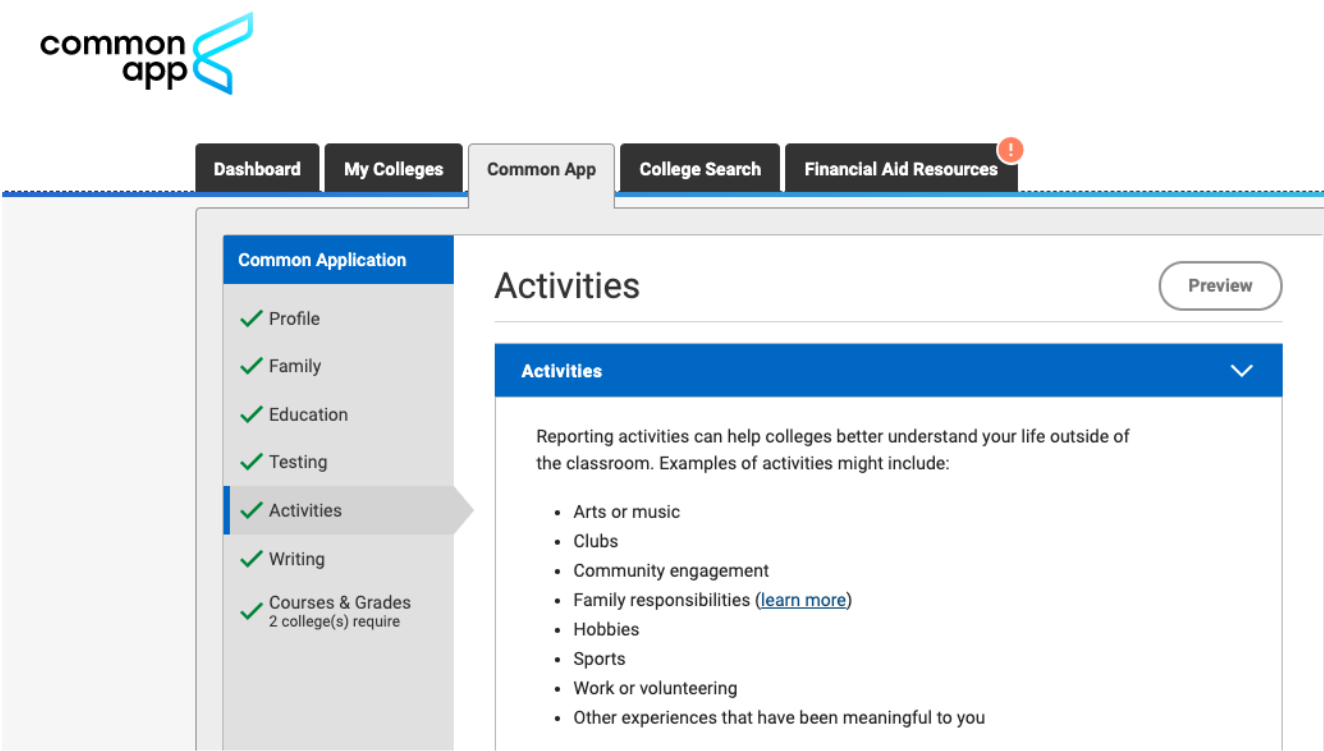Many students spend years preparing themselves for the college applications that loom ahead like the final boss in the epic journey that is school. However, very few know much about the college application process or Common App (the platform through which most students submit their applications).
As a senior in the midst of college application season, there’s a lot I wish I had known about what the process would actually be like. I could have prepared not only as an applicant, but for the applications themselves. I also could have saved myself a lot of time and trouble that I wasted on things I’d thought would be beneficial.
Learning about and understanding the college application process and Common App early on can help you prepare to be the best applicant you can be. Here are the 3 most important things I wish someone had told me about college applications.
- There is only room to include 10 activities on the Common App.
Like many high school students, I adopted the dangerously incorrect idea that more activities means a better application. I spread myself thin between clubs, sports, organizations outside of school, a job, and tried to join everything I thought would look good on my applications.
When it came time to fill out my Common App, I discovered that there was only room to include 10 activities (it seems like a lot, but things build up). I ended up choosing the activities that I had contributed the most to, spent the longest or most time doing, and had gotten leadership roles in. The activities I included on my Common App therefore ended up being the ones that most reflected my passions, goals, and interests rather than the extra stress I had put on my plate that I didn’t really care for.
Spreading yourself thin won’t help you on your college applications. They won’t get to see the extensive list of activities and involvements you are a member of. In fact, spreading yourself thin may actually harm you on your applications if you aren’t able to enumerate many leadership roles or demonstrate passion or commitment. Instead, become involved in things you are really passionate about and will be inclined to make a noteworthy contribution to, be it dog walking or activism.
- Recommendations can make or break your application.
Colleges look for students who will contribute something to the university community, build and improve its reputation, and be a valuable asset to society. Most require at least one confidential letter of recommendation from a teacher, which allows them to learn about you from the perspective of those around you.
They also allow optional additional recommendations, which may be from your employer, club advisor, a different teacher, or another non-biological authority figure in your life who can testify to your character and skills. Your recommendations may very well be the deciding factor between your acceptance or rejection into the school of your dreams.
Since you waive your right to read the letters your recommenders write about you, it is important that you ask people who you feel confident will write positively about you. If they don’t, there’s no way for you to find out or prevent the colleges from reading it.
Scoping for future recommenders is a process you can begin as soon as you start high school. Build bonds with teachers you like or whose classes you like, and put your best foot forward. If you have an idea of what you will want to study in college, take special interest in proving yourself to teachers whose classes correspond with your major (for example, if you plan on majoring in engineering, make sure you give a good impression to at least one math or science teacher). The last thing you want to do when you are stressing about applications is to have to depend on a teacher to write a recommendation without feeling confident that it will be positive.
- You will have to write way more essays than you think.
Whether it be writing and rewriting your Common App personal statement or applying to an honors program in addition to the college, the essays are not a one-and-done task.
Schools require you to write about diversity, obstacles you’ve faced, your interest in your designated first choice major, and more. You should strive to write essays that will make your reviewer want to meet you.
One of the most difficult things about writing each essay is picking a topic. It must be something you can write about in an engaging way that reflects your unique personality and experiences. You should strive to write essays that will make your reviewer want to meet you.
Be on the lookout for essay topics, and keep an open mind. You don’t need to have experienced great tragedy in your life to have interesting stories about things that helped you grow as a person, regardless of how trivial they may seem. It may pay off to keep a notebook or running digital list where you can jot down essay topic ideas that come to you, such as a question you have about something or an interesting interaction you have.
In conclusion….
Preparing to apply to colleges entails more than taking hard classes or signing up for lots of different clubs. Learning about the applications themselves and what colleges will be looking for will help you avoid putting your time and effort into the wrong places. Make small adjustments in how you approach certain things in your life so that when application season comes, you will be ready and avoid any pesky surprises.

Hi! My name is Jannah and I am a senior editor and multimedia editor for The Mycenaean. I am also a math tutor, engineering intern, and a tennis player.

Leave a Reply